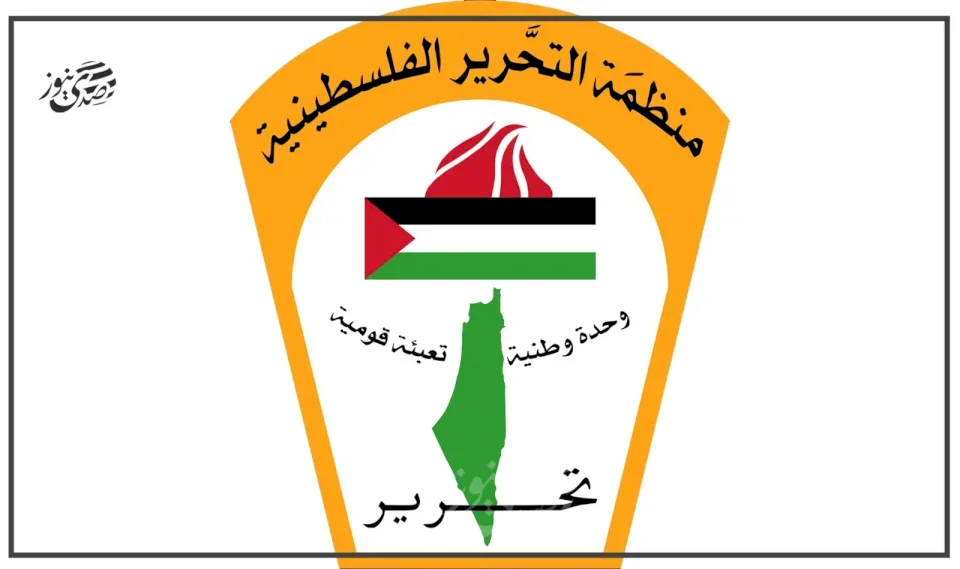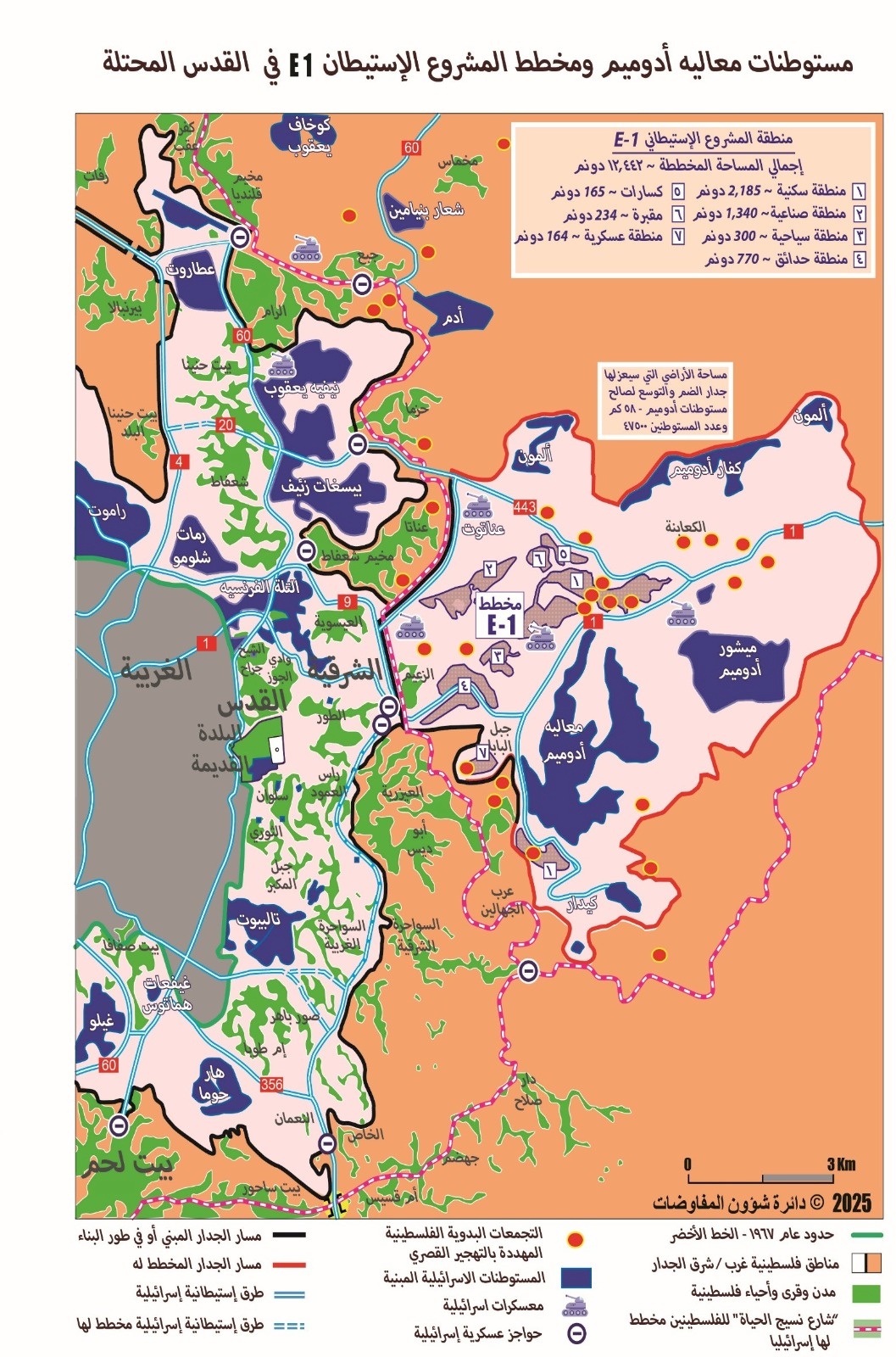
Position Paper: Settlement Expansion in E-1 and Ma’ale Adumim: A Serious Threat to the Two-State Solution
SadaNews - The Negotiations Support Unit of the Palestine Liberation Organization (PLO) has issued a position paper regarding settlement expansion in the areas known as E-1 and Ma’ale Adumim.
The unit stated in its report that, despite Israel's clear legal obligations under international law to halt all settlement activities, its systematic and ongoing colonization of Palestinian territories, particularly in occupied East Jerusalem and its surroundings, poses a serious threat to the two-state solution and undermines the geographical and political essence of a future Palestinian state.
Ma’ale Adumim settlement bloc, along with the adjacent E-1 settlement, is considered the most aggressive Israeli settlement project, aimed at fragmenting Palestinian territories and separating East Jerusalem from other parts of the West Bank.
The Higher Planning Council in Israel is scheduled to hold a final hearing on August 6, 2025, regarding objections to plans for building more than 3,400 new settlement units in the E-1 area. Approval of this plan would officially annex this strategic area, undermining any prospects for a viable Palestinian state and a two-state solution as we envision. This policy brief addresses the implications of this settlement expansion, recent political developments, international reactions, and offers urgent recommendations to counter this threat.
E-1 Settlement Plan
The position paper noted that since the 1990s, the occupying government has made every effort to advance the E-1 settlement plan, yet these efforts have repeatedly stumbled due to local and international opposition. Netanyahu revived the plan in 2012 and approved its deposit in 2020. Although the freeze on procedures and international diplomatic pressure have delayed the final approval, including public hearings that took place under successive Israeli governments, the scheduled hearing on August 6, 2025, indicates a renewed Israeli attempt to entrench these illegal settlements amid changing regional and international dynamics.
The current Israeli government is exploiting the international focus arising from the Israeli genocide against the Gaza Strip, which began in October 2023, to accelerate settlement construction, including in the E-1 area. In April 2025, the Israeli government approved the "Sovereignty Road" project between Al-Eizariya and Al-Za'im, and the "Alternative Road 80" from Bethlehem to Jericho. These projects fall within the framework of an apartheid policy, aiming to segregate Israeli and Palestinian traffic, enabling Israel to restrict Palestinian access to key areas in the West Bank and pushing towards the annexation of Ma’ale Adumim settlements, facilitating the E-1 settlement plan. At the same time, the Israeli water company, Mekorot, has begun to transfer vital infrastructure to support this effort.
These actions, condemned by both Palestinians and international observers, threaten to entrench irreversible facts on the ground, closing off any remaining pathways towards a just and lasting peace, according to the position paper issued by the unit.
Implications of Settlement Expansion
The Ma’ale Adumim settlement bloc currently includes, among its associated settlements such as Kfar Adumim, Almon, Kedar, and Mishor Adumim, more than 47,500 Israeli settlers, extending 14 kilometers deep into Palestinian territories, controlling nearly 58 square kilometers adjacent to the apartheid wall. Since April 2024, the Ma'ale Adumim settlement has seen rapid expansion. Israeli authorities have already approved the construction of more than 3,165 settlement units, with plans to build thousands of additional units across the West Bank in 2025.

Recently, the controversial E-1 plan has been reactivated, which includes the construction of more than 3,400 settlement units and extensive industrial and commercial settlement projects over an area of about 12.4 square kilometers of confiscated Palestinian land belonging to the surrounding villages, the paper states.
By 2025, the number of settlers in the West Bank, including East Jerusalem, is expected to exceed 740,000, representing a significant increase that deepens the demographic and regional fragmentation resulting from Israeli occupation and jeopardizes the prospects for reaching an agreement on the final status of the West Bank. Furthermore, under the current Israeli government, there are over 97,000 settlement units at advanced stages of approval and/or implementation – including 42,000 units in the West Bank and 55,000 units in East Jerusalem, reflecting an unprecedented scale of settlement construction.
Implications for Palestinians
The paper stated: This ongoing expansion of Ma’ale Adumim and the E-1 plan continues to fragment Palestinian territories and undermine Palestinian geographic continuity, effectively isolating East Jerusalem from the rest of the West Bank and separating southern West Bank from northern West Bank. More than 18 Palestinian Bedouin communities, mostly from the Jahalin and Sawahara tribes, numbering around 3,700 people, face the ongoing threat of forced displacement. These populations are confronting their third forced displacement process since 1948, the latest being driven by settlement expansion policies.
Moreover, the extensive land seizures and infrastructure development as in the E-1 plan will increase restrictions on Palestinian movement by cutting vital transportation arteries, isolating Palestinian neighborhoods, and exacerbating the state of geographic fragmentation that impedes the establishment of a sovereign, geographically connected Palestinian state.
Violations of International Law
The Israeli settlement activities in Ma'ale Adumim (E-1) and throughout the West Bank constitute a blatant violation of international law, including Article 49 of the Fourth Geneva Convention, which prohibits the occupying power from transferring its civilian population to occupied territories. These actions also violate United Nations Security Council Resolutions 242, 338, and 2334, and the advisory opinion issued by the International Court of Justice in July 2024, which affirmed the illegality of settlement expansion and annexation.
The United Nations, the International Court of Justice, and major countries, including France, the United Kingdom, and Jordan, have condemned the E-1 project, labeling it illegal and harmful to peace. The ongoing settlement policies deepen the expropriation of Palestinian lands and undermine the two-state solution.
Recommendations and Conclusions
It is essential to take concrete steps to force Israel to immediately halt all construction of new settlements and settlement expansions, particularly in the E-1 and Ma’ale Adumim areas, including ending government funding and support that facilitates the growth of settlers in the West Bank. Preventing further confiscation of Palestinian land, demolition of homes, forced displacement of Palestinians, and transferring Israeli settlers to occupied territories is crucial to ensure the future viability of a Palestinian state.
A comprehensive strategy should be developed to support the resilience of the most vulnerable and at-risk Palestinian Bedouin communities facing forced displacement by providing legal assistance, reconstruction aid, and access to essential services such as water, electricity, and healthcare. At the same time, appropriate mechanisms should be established to monitor and respond to cases of forced displacement.
At the international level, UN member states, especially permanent members of the Security Council, should issue a clear and unified warning against any settlement construction in the E-1 area. Diplomatic leverage should be utilized, including imposing conditions on bilateral relations and restrictions on agreements, to deter further Israeli settlement activities. Legal pathways should also be enhanced by supporting the efforts of the State of Palestine and coordinating with international legal institutions to follow up on accountability mechanisms.
Public awareness campaigns and global public diplomacy initiatives should also be strengthened to highlight the irreversible consequences of settlement expansion, galvanizing broad international support for peace and justice.
The settlement expansion in Ma’ale Adumim and the E-1 area represents a strategic and calculated Israeli effort to impose irreversible facts on the ground, effectively dismantling Palestinian geographic continuity. These actions are clear violations of international law and have been widely condemned by the international community.
The upcoming hearing on August 6, 2025, represents a critical turning point, necessitating urgent and decisive international intervention to halt these plans and support the principles of peace, justice, and Palestinian self-determination.

Tel Aviv Loses Its Scientific Elite.. For the First Time, the Number of Departing Academic...

Iranian Army: We Have Not Stopped Producing Missiles for a Single Moment Since the Israeli...

Severe Cold Claims the Life of an Infant in Southern Gaza Strip, Bringing the Toll to 13

The Shekel Approaches Record Levels... The Market Awaits: When Will the Bank of Israel Int...

The Occupation Shoots a Young Man and Arrests Him Near Qalandiya Checkpoint

American Strike Kills Four in East Pacific.. Venezuela Pushes for Emergency UN Meeting

Weather: Rising Temperatures While Remaining Cold

